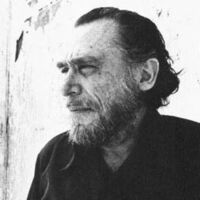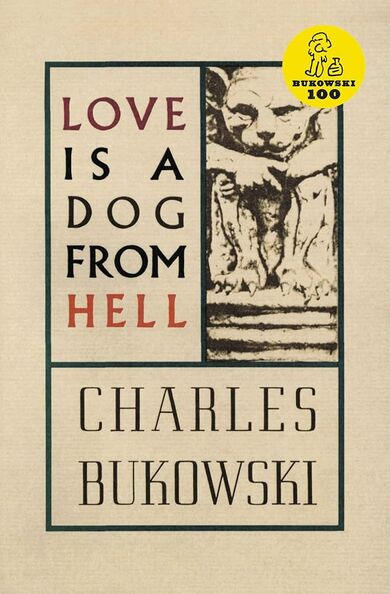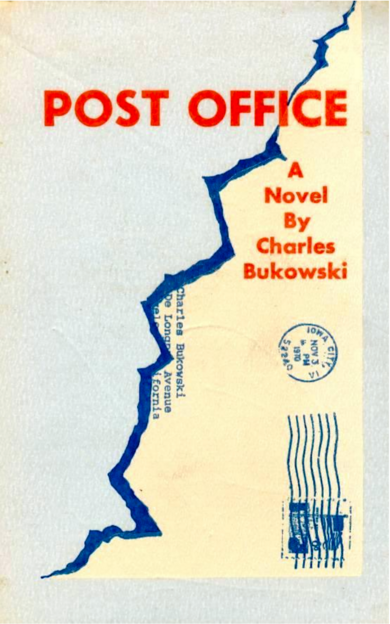Ham on Rye: 48
“So you couldn’t hold a job for a week?”
We were eating meatballs and spaghetti. My problems were always discussed at dinner time. Dinner time was almost always an unhappy time. I didn’t answer my father’s question.
“What happened? Why did they can your ass?”
I didn’t answer.
“Henry, answer your father when he speaks to you!” my mother said.
“He couldn’t hack it, that’s all!”
“Look at his face,” said my mother, “it’s all bruised and cut. Did your
boss beat you up, Henry?”
“No, Mother . . .”
“Why don’t you eat, Henry? You never seem to be hungry.”
“He can’t eat,” said my father, “he can’t work, he can’t do anything, he’s not worth a fuck!”
“You shouldn’t talk that way at the dinner table, Daddy,” my mother told him.
“Well, it’s true!” My father had an immense ball of spaghetti rolled on
his fork. He jammed it into his mouth and started chewing and while chewing he speared a large meatball and plunged it into his mouth, then worked in a piece of French bread.
I remembered what Ivan had said in The Brothers Karamazov, “Who
doesn’t want to kill the father?”
As my father chewed at the mass of food, one long string of spaghetti dangled from a corner of his mouth. He finally noticed it and sucked it in noisily. Then he reached, put two large teaspoons of white sugar into his coffee, lifted the cup and took a giant mouthful, which he immediately spit out across his plate and onto the tablecloth.
“That shit’s too hot!”
“You should be more careful, Daddy,” said my mother.
I combed the job market, as they used to say, but it was a dreary and
useless routine. You had to know somebody to get a job even as a lowly bus boy. Thus everybody was a dishwasher, the whole town was full of unemployed dishwashers. I sat with them in Pershing Square in the afternoons. The evangelists were there too. Some had drums, some had guitars, and the bushes and restrooms crawled with homosexuals.
“Some of them have money,” a young bum told me. “This guy took me to
his apartment for two weeks. I had all I could eat and drink and he bought
me 'some clothes but he sucked me dry, I couldn’t stand up after a while.
One night when he was asleep I crawled out of there. It was horrible. He
kissed me once and I knocked him across the room. ‘You ever do that again,’
I told him, 'and I’ll kill you!'”
Clifton’s Cafeteria was nice. If you didn’t have much money, they let
you pay what you could. And if you didn’t have any money, you didn’t have to pay. Some of the bums went in there and ate well. It was owned by some very nice rich old man, a very unusual person. I could never make myself go in
there and load up. I’d go in for a coffee and an apple pie and give them a
nickel. Sometimes I’d get a couple of weenies. It was quiet and cool in
there and clean. There was a large waterfall and you could sit next to it
and imagine that everything was quite all right. Philippe’s was nice too.
You could get a cup of coffee for three cents with all the refills you wanted. You could sit in there all day drinking coffee and they never asked you to leave no matter how bad you looked. They just asked the bums not to bring in their wine and drink it there. Places like that gave you
hope when there wasn’t much hope.
The men in Pershing Square argued all day about whether there was a God or not. Most of them didn’t argue very well but now and then you got a Religionist and an Atheist who were well-versed and it was a good show. When I had a few coins I’d go to the underground bar beneath the big
movie house. I was 18 but they served me. I looked like I could be almost any age. Sometimes I looked 25, sometimes I felt like 30. The bar was run by Chinese who never spoke to anyone. All I needed was the first beer and then the homosexuals would start buying. I’d switch to whiskey sours. I’d bleed them for whiskey sours and when they started closing in on me. I’d get
nasty, push off and leave. After a while they caught on and the place wasn’t any good anymore.
The library was the most depressing place I went. I had run out of
books to read. After a while I would just grab a thick book and look for a young girl somewhere. There were always one or two about. I’d sit three or four chairs away, pretending to read the book, trying to look intelligent, hoping some girl would pick me up. I knew that I was ugly but I thought if I looked intelligent enough I might have some chance. It never worked. The girls just made notes on their pads and then they got up and left as I
watched their bodies moving rhythmically and magically under their clean dresses. What would Maxim Gorky have done under such circumstances?
At home it was always the same. The question was never asked until
after the first few bites of dinner were partaken. Then my father would ask, “Did you find a job today?”
“No.”
“Did you try anywhere?”
“Many places. I’ve gone back to some of the same places for the second
or third time.”
“I don’t believe it.”
But it was true. It was also true that some companies put ads in the
papers every day when there were no jobs available. It gave the employment department in those companies something to do. It also wasted the time and screwed up the hopes of many desperate people.
“You’ll find a job tomorrow, Henry,” my mother would always say . . .






